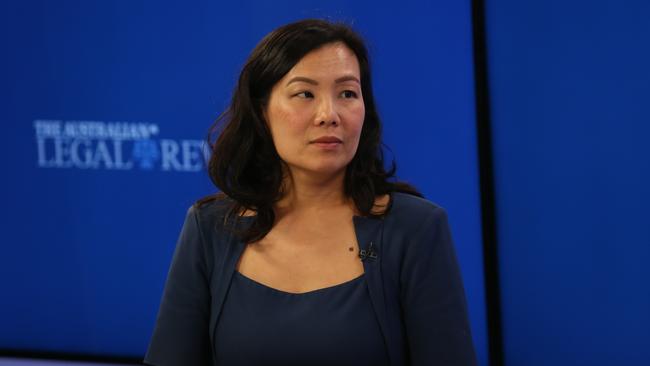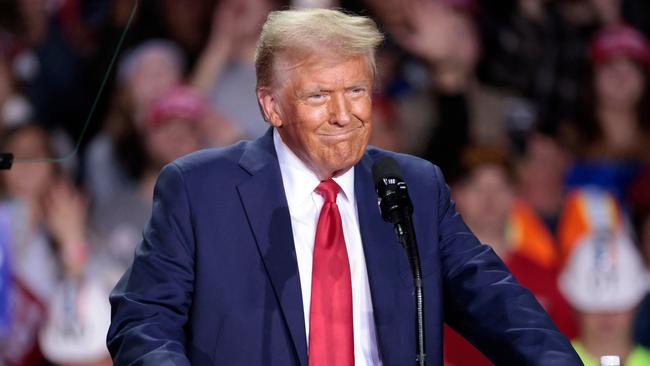US global investment could be put on hold if election raises geopolitical uncertainty, says Corrs
US companies could put investment plans for Australia on hold if there is geopolitical uncertainty after the presidential election, one of Australia’s top mergers and acquisitions lawyers says.

US companies could put their investment plans in Australia on hold if there is geopolitical uncertainty in the wake of the presidential election, law firm Corrs Chambers Westgarth head of corporate Sandy Mak says.
In an interview with The Australian, Ms Mak – one of Australia’s top mergers and acquisitions lawyers – said US companies were historically wary of investing offshore in times of volatility and uncertainty.
American companies are one of the largest foreign investors in Australia with US companies and US private equity firms both very active in the Australian market in recent years.
“It’s hard to predict,” Ms Mak said, discussing the potential impact of the US election on US investment in Australia and global M&A deals.
“I don’t know what Trump’s position on Israel and Palestine and Ukraine and Russia will be,” she said.
“Then there is the situation regarding US relations with China.”
“Volatility is always very dangerous for the M&A market.
“It just makes it really uncertain to do deals.”
A Corrs survey of foreign investment deals involving ASX-listed companies, to be released next week, shows North America is the second largest source of corporate bids over the past year, second only to Asia as a source of capital for M&A deals with ASX-listed companies.
“North America contributes a huge amount in terms of M&A activity into Australia,” she said.
“If you’ve got US bidders who are very uncertain about life, it can have an impact (on their interest in investing offshore).
“It can slow things down. It can cause people to put things on hold for a little bit to see whether things stabilise.”
Republican candidate Donald Trump has vowed to impose tariffs on most imports into the US if he wins, with potential tariffs of as much as 60 per cent on imports from China.
He has also indicated he would cut back funding for Ukraine in its battle to withstand Russian forces and Israel, potentially adding to instability in Ukraine and the Middle East.
While he has vowed to be tough on Chinese imports, it is unclear whether Mr Trump would respond to any Chinese aggression towards Taiwan or Chinese military expansion in the South China Sea.

Ms Mak said she had seen a recent increase in interest by US companies bidding for companies in Australia, with some keen to get deals done before the end of the year. She said she expected it would take some time before the outcome of the US presidential election affected the global political situation.
“I don’t think that there will be any immediate change (in US corporate interest in investing in Australia),” she said.
“Foreign policy is something that takes a while to play out, regardless of who wins.”
Ms Mak said the Corrs survey showed Asian companies were the biggest bidders for Australian companies, led by Japan where an increasing number of companies are buying up a range of Australian listed companies.
She said she was concerned at the decreasing number of stocks listed on the ASX, which she said was not good for the economy.
The number of companies listed on the ASX has gone down from more than 2200 in 2018 to 1998 in September this year.
This is a result of a slowdown in the number of new listings as well as ASX companies being delisted after being bought by larger companies, including foreign bidders.
“There has been a lot of talk about how we’ve got an increasingly small pool of Australian listed companies,” she said.
Ms Mak said the smaller number of ASX-listed companies was not good for the health of the overall market nor for retail investors. “What is missing from the discussion is the importance of having a robust market of ASX-listed stocks”, which she said was “good for our market and good for retail shareholders”.
“It’s also good for super funds to have Australian listed companies to invest in,” she said.
She said the real valuations of unlisted companies were not clear for investors. “If you invest in an unlisted company, the valuations are unclear,” she said.
“If you invest in a listed company, it is really transparent where the value of the investment sits at any point in time.
“To put all of our investments into private capital, which is a much less regulated space than the listed space, is not a good outcome.”
She said there needed to be a “healthy balance between access to private capital and access to public capital”.
“Ensuring that we’ve got a good pipeline of companies that are coming to market on the ASX is the key to maintaining that balance.”
She said super funds such as AustralianSuper were concerned that there are Australian companies such as energy company Origin which should remain listed. “They are willing to take strong positions and willing to vote on things, willing to make truth and take over statements about how they will support or not support a transaction.”
She said there was an increasing number of companies now which preferred to remain private where they could operate without the scrutiny of a public company or the regulations imposed on listed companies.
Regulation was essential for listed companies to protect retail shareholders, she said, but policy makers in Australia should review the situation to make sure regulations were not out of step with other jurisdictions, particularly the US.
She said the fall in the number of listed companies in Australia was as a result of several factors including the easy availability of private capital and the ability of successful Australian companies to choose to list overseas, particularly in the US.
“If they do decide to go public, they have a choice of jurisdictions. It doesn’t have to be in Australia. We have to make our rules competitive as to public and private capital, but also as between one stock exchange and another.
“That’s the challenge that we’ve got,” she said.
She said the London Stock Exchange and European stock exchanges were also facing the same challenges of a falling number of listed companies, with some companies choosing to list in the US.
“There is a need for regulation to protect investors in this thing, but we need, as a corporate community, to find the balance between (protecting investors and encouraging companies to list on the ASX).
“It may be about regulating private capital as well, rather than just deregulating public capital.
“We need to find the balance between the regulation of public and private capital to incentivise companies to come to market, because it is in everyone’s interest that we have a widening stock exchange with lots of companies that are wanting to IPO.”




To join the conversation, please log in. Don't have an account? Register
Join the conversation, you are commenting as Logout